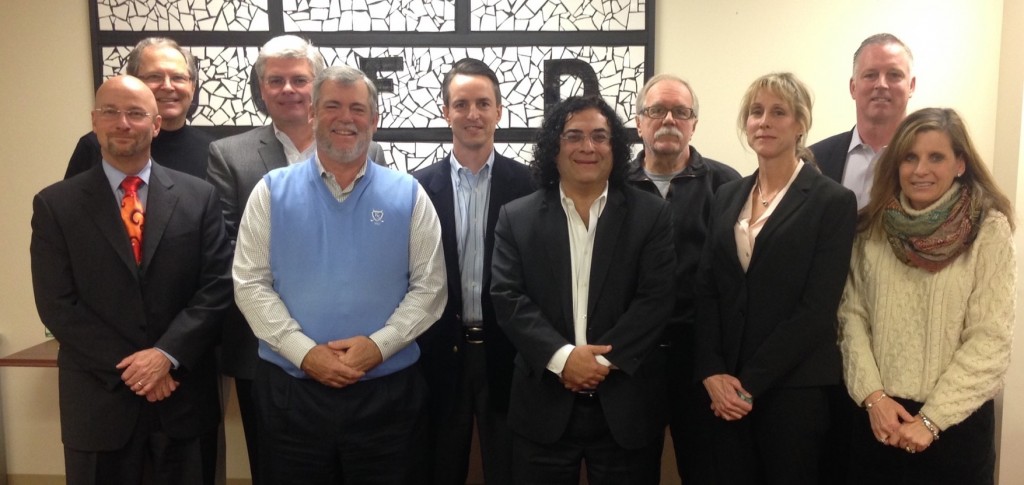
New members join the board for first work session – John Murphy second from right, and Elise Anderson, third from right.
Preliminary budget for 2016-2017 reviewed
By Karen Cresta, Staff Writer, The Times
EAST MARLBOROUGH – The Unionville Chadds Ford School District (UCFSD) Board of Education had its first work session meeting of 2016 on Monday night that included new members Elise Anderson and John Murphy.
With the new board in place, the proposed policy change to exclude decile ranking of students according to their cumulative Grade Point Average (GPA) was discussed. This proposed changed was studied over the last year.
The proposed updated policy will strike the sentence, “Students are ranked by decile according to cumulative GPA.” And add, “Student ranking will not be shared. Exceptions may be made on a case-by-case basis, for example, when students apply to service academies where rank is required for application.”
The proposed change will be examined at the next board meeting on January 25. There will be a first reading of the proposal and, if needed, revisions will be made, discussions with the curriculum council will take place, and communications will go out to parents and students.
Senior students in attendance for AP Government class requirements were given the chance to comment on the proposed policy. One student voiced his concern that he is only in the top 50/60 percentile among peers and applying to out of state colleges, not familiar with the district’s excellent reputation and competitiveness, it could do harm.
According to board member Carolyn Daniels, the proposed policy would change that. If the ranking is presented, it is used by the college, but if not presented at all, it isn’t held against the applicant.
If the policy change is approved, the district would go from reporting a decile ranking to not reporting a class rank of any kind, according to board president Victor Dupuis. Per the board, this is not a major piece of the college application process. Instead, the “whole picture” is assessed.
Also on January 25, the board will be voting on the district’s 2016-2017 preliminary budget. In preparation, Robert Cochran, director of business and operations, reviewed the expected budget status. He explained to the board that the Governor has yet to settle last year’s budget let alone propose the current one which should be done by February. The current budget needs to reflect a need for Act One Index exceptions. The board will have the flexibility through the process to utilize exceptions or not.
The budget reflects approximately $950,000 use of fund balance and about $1 million use of exceptions.
“That gives us about a four percent millage impact. This in no way locks this board into using these exceptions or raising taxes to that level,” Cochran said.
Spending would have to be reduced by about $950,000 to at least stay within the Act 1 Index, plus exceptions, and not use fund balance, Cochran explained.
Discussions on program reductions and use of fund balance will continue throughout February and March, and budget hearings and recommendations from the administration will occur into May and the final budget and levying of taxes will be approved by June.
The board will also be voting next week on the 2016-2017 school year calendar and a concurrent enrollment agreement with West Chester University so senior high school students can attend classes on the university campus upon approval.
A facilities update was given by the supervisor of buildings and grounds Rick Hostetler. The construction at Patton Middle School has been delayed from the expected completion date of December 18. The move-in date to the new offices and entrance is expected for the last week in January – first week in February.
Hostetler informed the board of the status of Patton’s auditorium renovations as part of the ten-year plan. Bids will be going out in early February and the exterior work will begin in May. Interior work will be done in the summer with an expected completion date by September. The interior updates include a new seating configuration, ceiling, lighting and flooring upgrades, and new sound equipment. The exterior updates include the entrance and lobby areas of the auditorium.
Anderson, new board member and communications chair, promised to go a level up in many areas of communication coupled with technology. She mentioned that “opportunities lay ahead” and she will “look at it strategically.”
She also thanked Mike McGann for the UCF Connect magazine as a step in the right direction and based on the recent cease in publication notice (effective in April) due to financial struggles, “promised to put time and thought into this piece.”
The board’s next meeting will be held on January 25, 7:30 p.m., at Patton Middle School. All board documents and meeting minutes can be viewed by visiting www.ucfsd.org. ing upgrades, and new sound equipment. The exterior updates include the entrance and lobby areas of the auditorium.
Anderson, new board member and communications chair, promised to go a level up in many areas of communication coupled with technology. She mentioned that “opportunities lay ahead” and she will “look at it strategically.” She also thanked Mike McGann for the UCF Connect magazine as a step in the right direction and based on the recent cease in publication notice (effective in April) due to financial struggles, “promised to put time and thought into this piece.”
The board’s next meeting will be held on January 25, 7:30 p.m., at Patton Middle School. All board documents and meeting minutes can be viewed by visiting www.ucfsd.org.






http://www.mainlinemedianews.com/articles/2016/01/13/main_line_times/opinion/doc569648543e221628102920.txteith Knauss guest • 17 hours ago
OK, guest, I’m going to act against my better judgement and explain why the “abolish committee meetings” critique is without merit. Let’s see if it falls on deaf ears. First, there still is a curriculum committee meeting and personnel committee meeting each month separate from the work session and board meeting at UCF. The curriculum meeting is open to the public; the personnel meeting for obvious reasons is not. Two or so years ago the board voted to curtail the facilities committee meeting and the finance committee meeting and move discussion of those topics into the work session. Why? Because those meetings were held at times when several interested board member with full time jobs and the working public could not attend. Moving those topics into the work session beginning at 7PM makes those meetings sometimes excruciatingly long, but the full board and public gets to participate in finance and facilities. Thus, transparency was increased and my position is not disingenuous.
————————————————————————————–
Keith, they are not posting my respectful well thoughtout replies anymore so I brought the conversation here.
Interesting that you chose to “curtail” finance and policy. And you didn’t “curtail or make less, you abolished or eliminated the meetings. Reminds me of Dr. Rock’s point about you cherry picking data to suit your own agenda.
There needs to be offered and available to the public as much time through committee meetings and workshops as possible to discuss finance and facilities matters, the two areas most influencing tax payer hikes. Look at your district and the new office space at the middle school. Did citizens have a say in that decision since you “curtailed” the facilities committee?
I don’t understand how you don’t understand that your position seems disingenuous when you write a letter to the editor in a neighboring district about their lack of transparency when your own school board director resigned stating:
Please read: http://pattyebenson.org/2013/1…
Manzone listed the following six issues in her resignation from the U-CF school board:
“Open discussion is frowned upon and dissent is squelched at both the public and executive meetings.
Meetings, especially public meetings, are often orchestrated,
with many “pre-meetings” and phone calls behind the scenes to prevent genuine public discussion of contentious issues and avoid any embarrassment to the administration or the Board, i.e., “no dirty
laundry.”
Executive sessions are over-used. If there is a way to
characterize a topic so that it can be discussed privately in executive session, it is. Engineering topics in this way may allow the district to comply with the letter of the Sunshine Law, but it surely violates its spirit.
Community members raising issues are often themselves considered the problem. Energy is expended complaining about these individuals rather than focusing on improvement.
Access to underlying data and original documents is withheld, even if it is not confidential. “Confidentiality” is used as an excuse to withhold access to broad categories of data, without foundation.
Others in your district have said the above is true. Do you, at the very least, see how citizens could view your letter, if not disingenuous, then hypocritical?
The proposed updated policy will strike the sentence, “Students are ranked by decile according to cumulative GPA.” And add, “Student ranking will not be shared. Exceptions may be made on a case-by-case basis, for example, when students apply to service academies where rank is required for application.”
—————————————————————————————–
This is a good move. 25% of the current Junior class at CHS is in national Honor Society. 4.7 GPA and above. So anyone not in NHS is not ranked in the top 25% of the class. The next 25% have “A” averages. It’s probably the same at UCF. So students at CHS, who have solid “B” Averages are in the bottom 50% in ranking.
Why then, do Districts need to hire and retain an Army of Administrators and pay them outlandish salaries? In TE, they create presentations asking Boards to hire more. They have little to no contact with students and are a huge financial burden for the tax payer.
Mr. Cochran, why does the Board need to reflect a need for Act 1 exceptions?
Why is the Board discussing program reductions? You have an Assistant Supt. rakng in $193,000 per year, and you’re talking about program reductions for students and raising raising taxes for citizens. Further proof about my point that the money DOES NOT GO TO THE STUDENTS.
When you have new construction for Administrator office space and Administrators who make way more money in salary than their counter parts in the private sector who pay these outlandish salaries, tax payers should not have to pay one cent in tax increases.